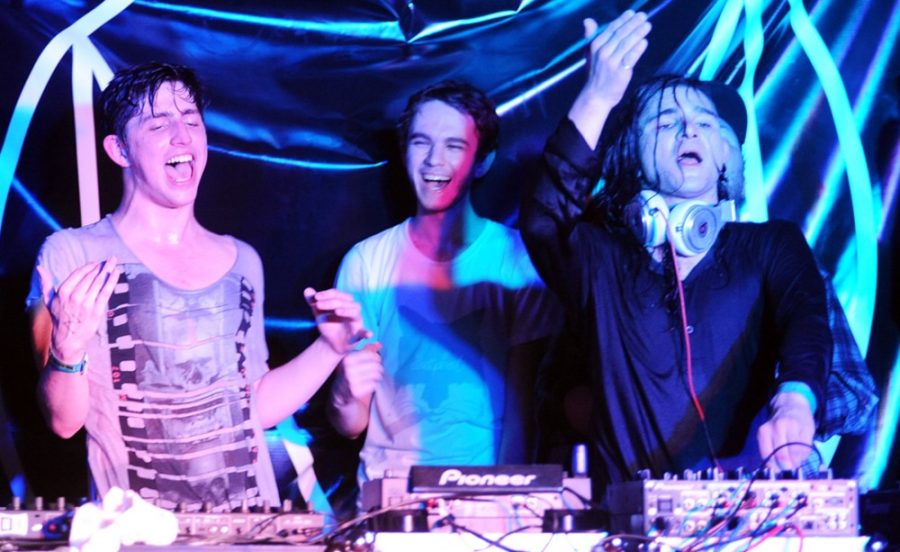It is Aug. 27, the day before one of the most recognizable names in electronic music kicks off his international tour, and he’s having trouble finding a working phone for the interview.
“Sorry about the delay,” said Porter Robinson, who is venturing across North America on his “Worlds” tour. “I was on a hunt in a massive labyrinthine venue for a charger.”
The “massive labyrinthine” venue where Robinson had been rehearsing and fine-tuning the sights and sounds of his new show was the Vogue Theatre in Vancouver, British Columbia, a good distance from Robinson’s hometown of Chapel Hill, N.C.
“To be honest with you, I’m pretty anxious because this is my first time going on the road with this style of music,” Robinson said. “It’s a big, big change.”
The reason behind the artist’s slight unease is the new style of music showcased in his “Worlds” album, which was released on Aug. 12. It is unlike anything he’s trotted out before and is the antithesis of the electronic dance music scene at large.
His first EP, Spitfire, which debuted in 2011, has a cornucopia of sounds and genres. There’s the harsh, glitchy dubstep of the wonky sample-heavy song “100% in the Bitch,” and the uplifting synths and airy voice of Jano on “The Seconds.” Reflecting, Robinson said he feels this first effort was meant more to impress rather than express.
“I was more of a craftsman and not so much an artist at the time,” Robinson said. “I know it always feels so weird to call yourself an artist or whatever, but my goal back then was just to showcase the style.”
On a broader note, it really does feel like there is a schism starting to form in the electronic music scene, specifically around the party-ready culture.
Larry Fitzmaurice, the reviews editor for Pitchfork, said, “An aggressive, toxically masculine culture … [has] pervaded mainstream American dance culture.”
Famed producer Diplo has banned kandi — vibrantly colored bead jewelry popular at raves — at his concerts. After a drug-related death at this year’s Ultra Music Festival, Miami Mayor Tomas Regalado considered not allowing the festival back next year.
Robinson, too, is keen to show that his music is much more than “EDM.” On Sept. 1, a tweet of his read, “my shows are not raves.”
To create music that rang true to him, he stepped off the dance floor and into the worlds of fantasy and science fiction.
Growing up in Chapel Hill, Robinson delved into the expansive universes of massively multiplayer online role-playing games like “Star Wars Galaxies,” “City of Heroes” and “World of Warcraft.” Unlike most video or computer games, these fictional worlds span a realm of digital square miles, which allows the player to get lost in their vastness.
Robinson desired to evoke these far-off places through his music. These aren’t covers of songs found in the games, but rather, the feelings the games bring about distilled into a song.
“It’s … adopting the aesthetic of that music,” Robinson said. “A lot of that effort was going back and finding sounds from those games.”
Fitzmaurice, in his review, calls Robinson’s album, “Part synthy indie-pop, part twinkling bedroom-beatmaker fare, part festival-ready electro.”
In one single off the album titled “Sad Machine,” Robinson sings a duet with a robot girl, his fallible human voice and the infallible android voice melding into one. You won’t find a song like this being played in the clubs.
For his tour, Robinson will be playing keyboard and singing live, taking on more responsibilities than someone who just mans the decks.
“I don’t think I’m necessarily making my big debut as the next Sam Smith,” Robinson said.
With both an album and a tour, he hopes to convince his fans of his commitment to his new style. Local Tucsonans can judge for themselves how they like Robinson’s new style as he makes a stop at the Rialto Theatre tonight.
“That was my philosophy going in,” Robinson said. “I’m going to do this, and I don’t know what’s going to happen in the end, but fingers crossed.”
—Follow Alex Guyton @GuyTonAlexAnder









